Andor
One way out.
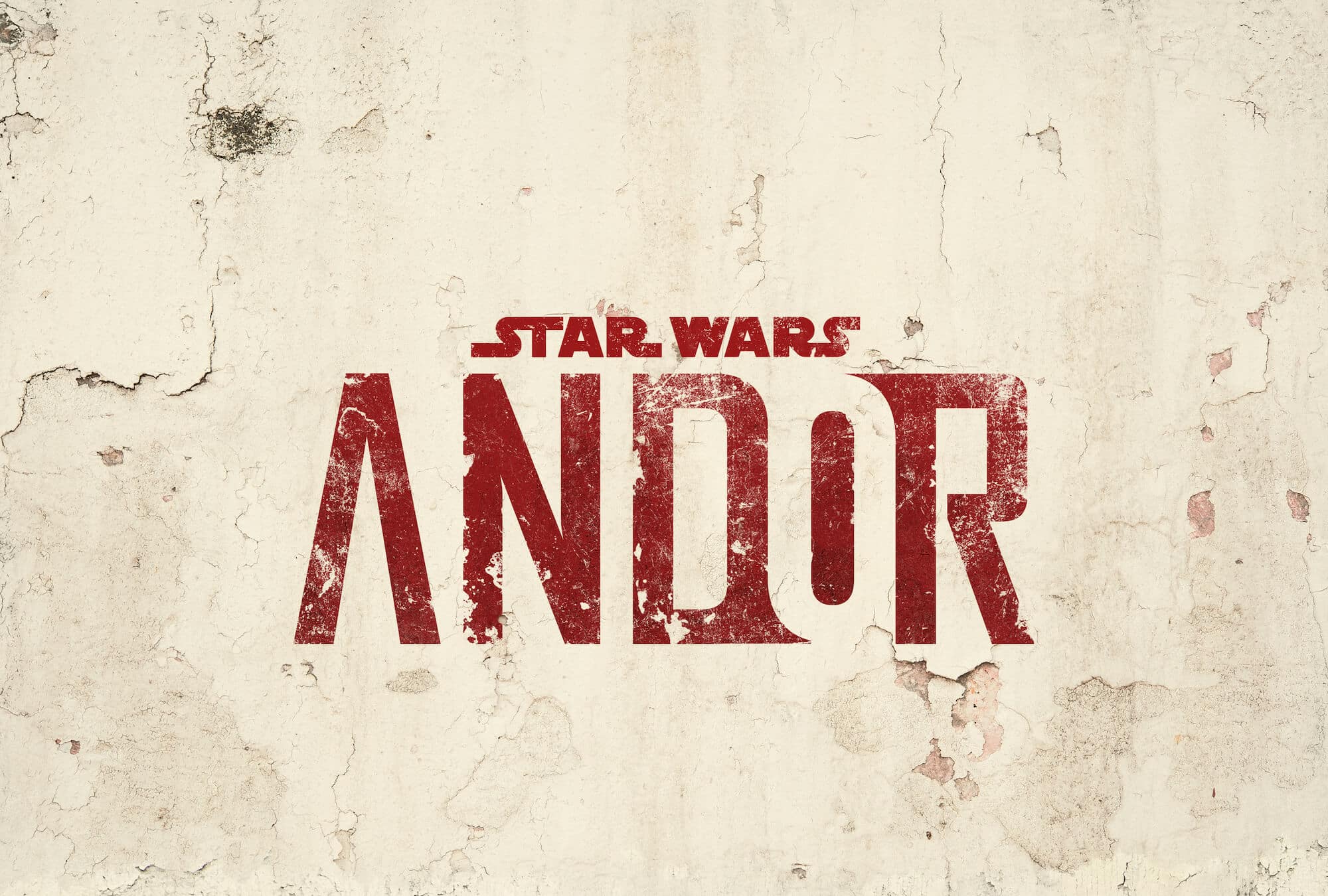
Andor is the story of the man who would one day play a key role in the theft of the Death Star plans, the moment when the tide turned for the entire galaxy. It is the story of the Rebel spy known as Cassian Andor, and it takes place during the height of the Empire’s power, and during the formative years of the Rebellion.
It is the story of that awakening.
“The pace of repression outstrips our ability to understand it. And that is the real trick of the Imperial thought machine. It’s easier to hide behind forty atrocities than a single incident.”
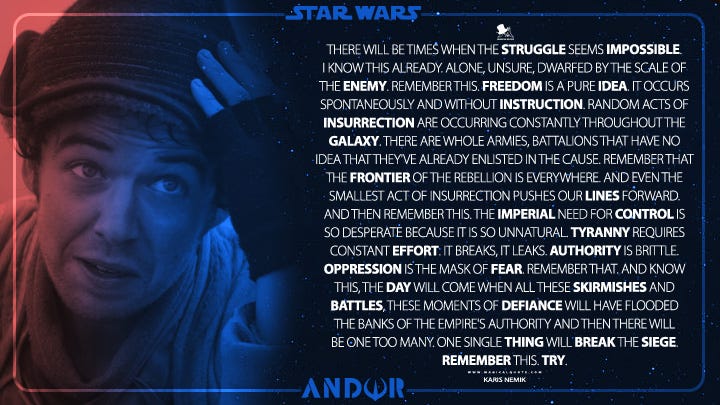
Andor is exactly the kind of Star Wars story that I like.
This is the exact style of Star Wars I originally fell in love with back in 1977. It’s rooted in the same choices that made me a Star Wars kid instead of a Star Trek kid. This is the hard-used, hand-built, heavy equipment look of Star Wars, a place where everything has that lived-in and beat-down feeling. This look and feel has always appealed to me much more then the Prequel's clean high fantasy Apple store Magician version ever has.
On top of all that, Andor is also a story that somehow manages to get new blood from an old stone, all while still being irrevocably intertwined with the same kind of social commentary that is just relevant today as it was then. That alone would be impressive, but this is happening while also being a riveting story of the early days of the Rebellion, as well as a thrilling space adventure. On top of all that, Andor is also a story that finally makes the Star Wars universe seem like a real place, a place that real people lived in, which is great, as the last few years especially has made it seem more like Disney World’s Occupied Space-Paris Land.
In a nutshell... it’s fantastic.
Season one of Andor is broken up into sections that could each stand alone as separate stories, but together, they weave a tapestry of different people living under the same boot of oppression, showing their seperate, but connected lives, lives that are slowly being pushed toward their destinies, lives that are shaped not only by their own decisions, but by the larger events that are beyond their control. Even better, each story is filled with familiar and specific little moments that are vitally important to making the characters seem whole and real. It is all done so well too, that it almost seems effortless. Despite being a space adventure set in a universe of strange aliens and spaceships, these characters are all believable and relatable. This is one of the main reasons why this tale of rebellion and revenge from a long time ago in a galaxy far, far away works as well as it does, because of the time and effort the show devotes to developing its characters.
And what great characters they are too…
Diego Luna’s Cassian Andor is definitely a marquee name in the Star Wars universe now. A character who was practically a nobody only a few years ago, he is now up there with Luke and Han and Leia, one of the big names. But while he’s great, the glue of the show obviously, its uniting factor, is the smaller characters. They're the ones who really shine.
Because let's be honest, there isn’t a better, more well-earned, more iconic moment for the entire franchise, then when Andy Serkis’ Kino Loy finally says:
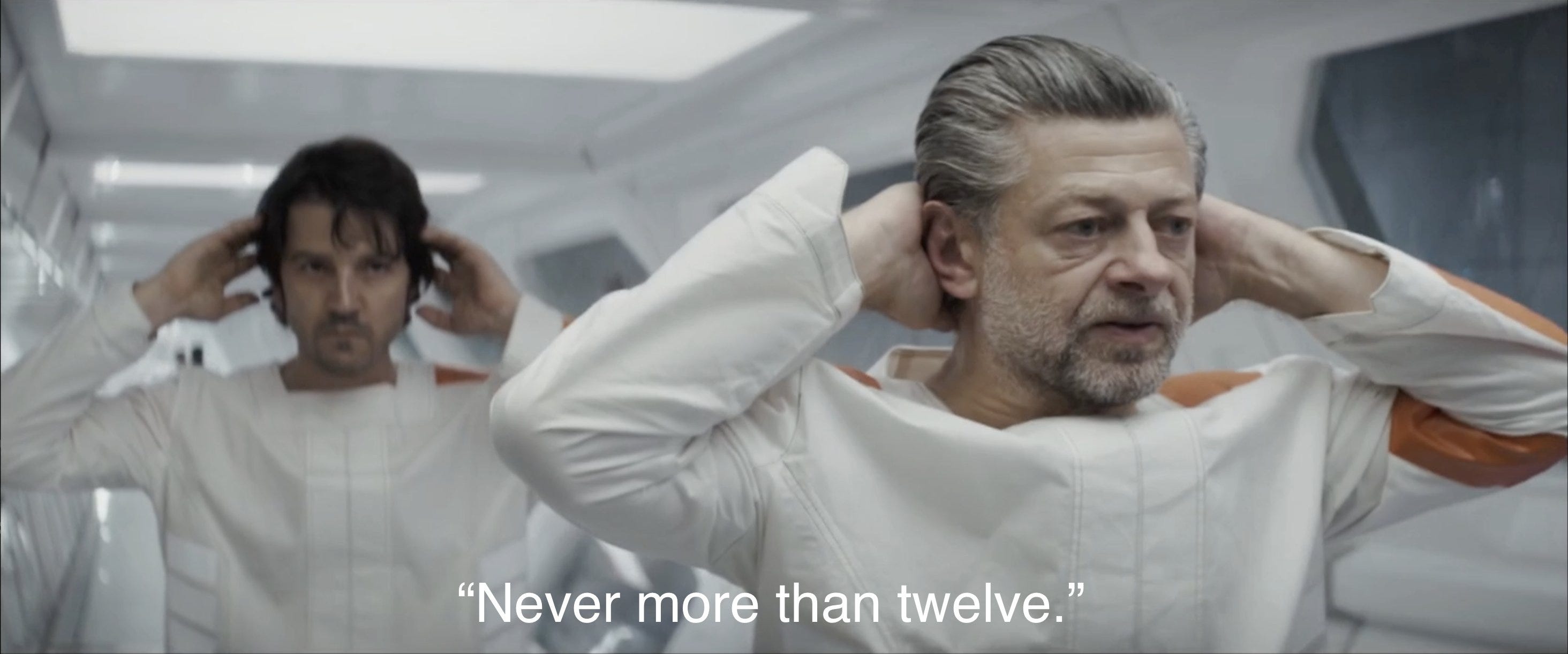
Well… except for maybe later on, when he says: “I can’t swim.”
A close follow-up for the most iconic moment, and definitely a legendary bad ass one in and of itself, is at Maarva’s funeral, after the recording of her final words—which were a rousing call to arms, encouraging the righteous fire of rebellion—are interrupted by the occupying Imperial forces, and Joplin Sibtain’s Brasso, driven by rage and frustration, filled to the brim with the insults and slights and the harm caused by their oppressors, smacks an Imperial in the head with the funerary brick made from Maarva’s ashes, and sends the fascist sprawling.
Truly amazing.
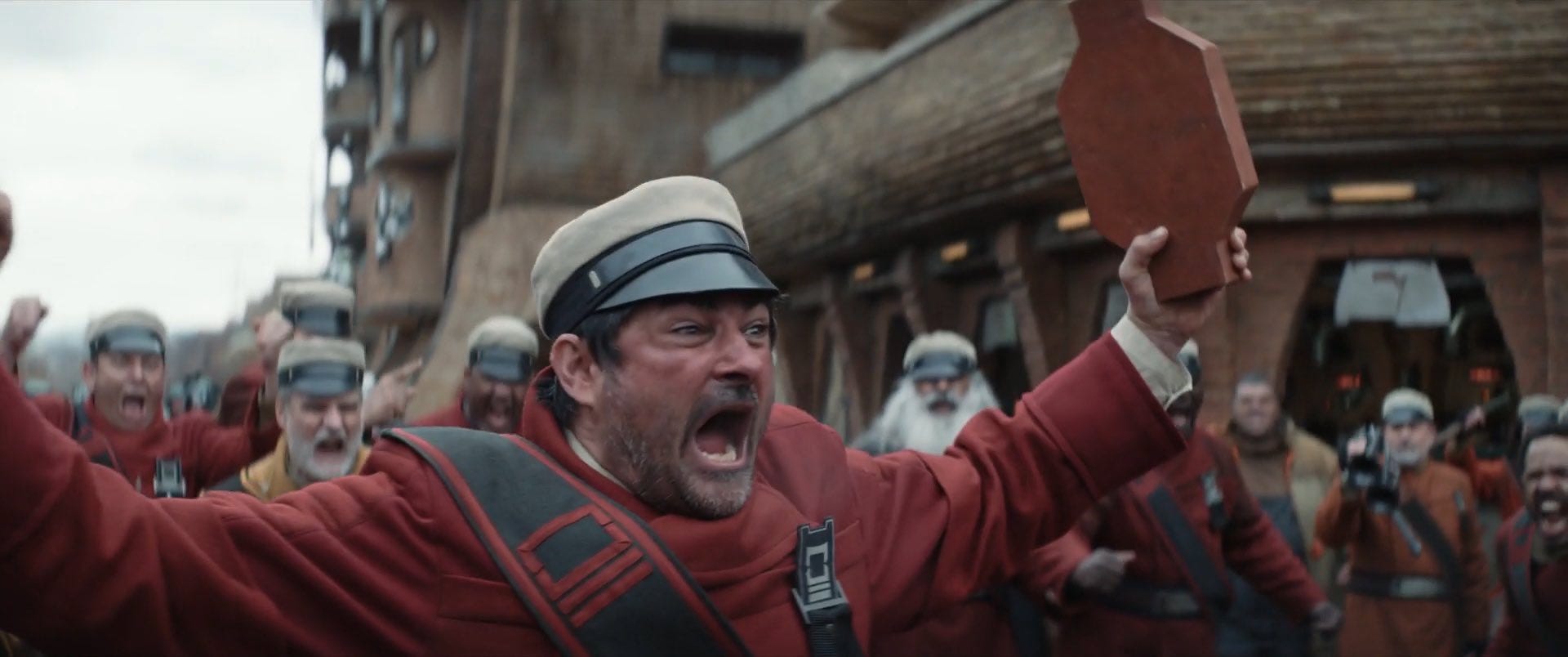
And they aren’t the only great characters either…
Adria Arjona’s Bix Caleen is fantastic as a person who just wants to live their quite little life, and is so full of doe-eyed innocence, only to end up being shown that this isn't possible, as she is smashed on the rocks of Great Upheavals in History. Then there’s the poor little stuttering droid B2-EMO, like a child who has been orphaned by events they can barely comprehend, he is a heartbreaking character... which is amazing, because we’re talking about a robot that is shaped like a rolling air filter here. And then of course, there’s Genevieve O’Reilly, who has taken Mon Mothma, the very definition of a minor character in this franchise, and has made her into an icon to rival Leia. And then we also get the daily trials and tribulations, the hallway and conference room back-stabbing, and the vicious ambitions of the Corporate Officers and the Imperials too.
Amazing work. An embarrassment of riches.
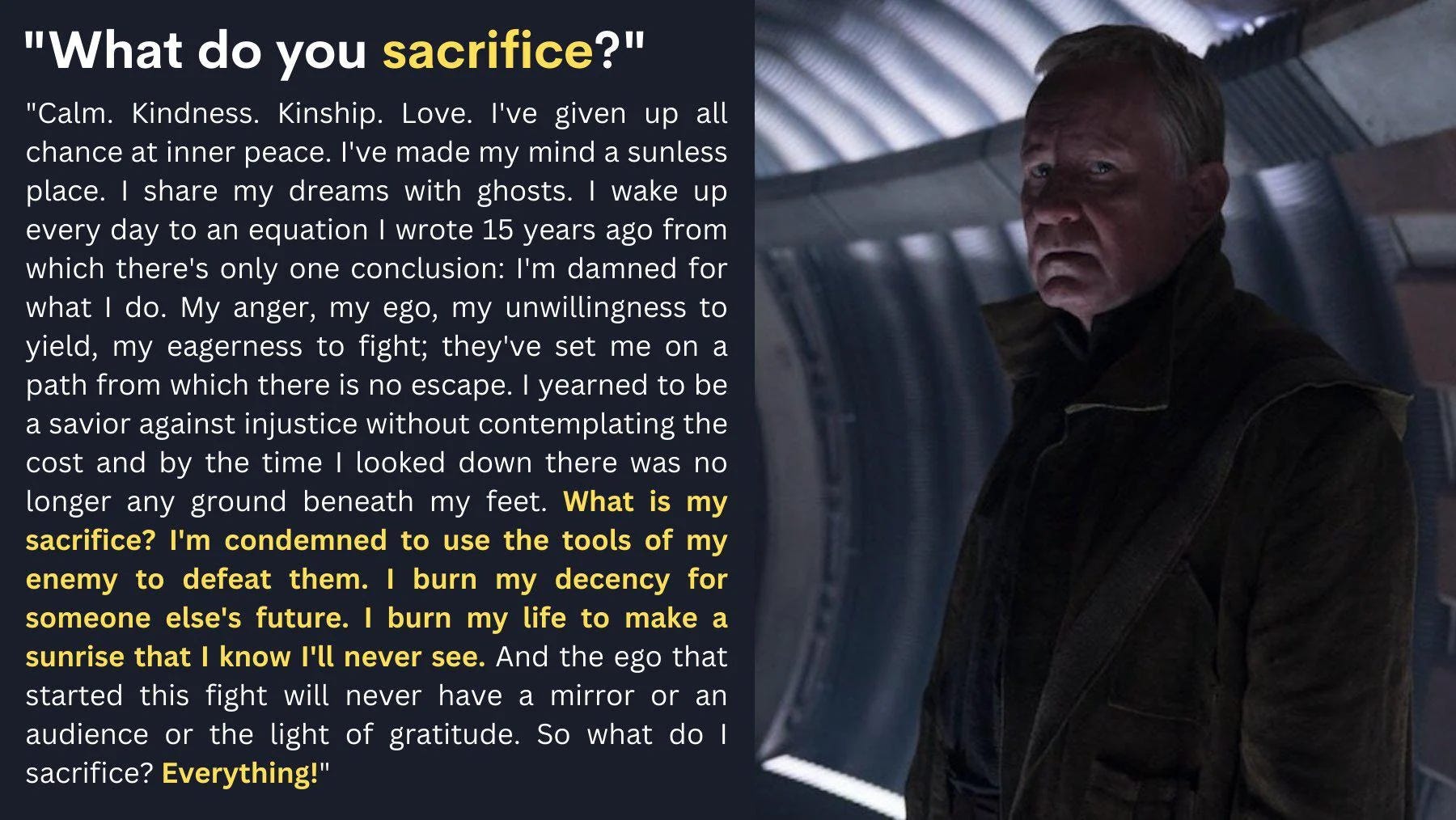
But as compelling as they all are, it is Stellan Skarsgård’s Luthen Rael who makes rules them all. Ruthless. Dedicated. Rael is truly a man of the shadows, he is both a monster, and a hero of the Rebellion. He is a man willing to make any sacrifices in the name of the cause, everything and everyone is just a weapon for him to use or destroy in his efforts to bring down the Empire. “I burn my life to make a sunrise that I know I’ll never see,” is a hell of a quote.
PLUS... we even get more of Forest Whitaker’s wheezy, heavily scarred, and wildly paranoid revolutionary Saw Gerrera too?
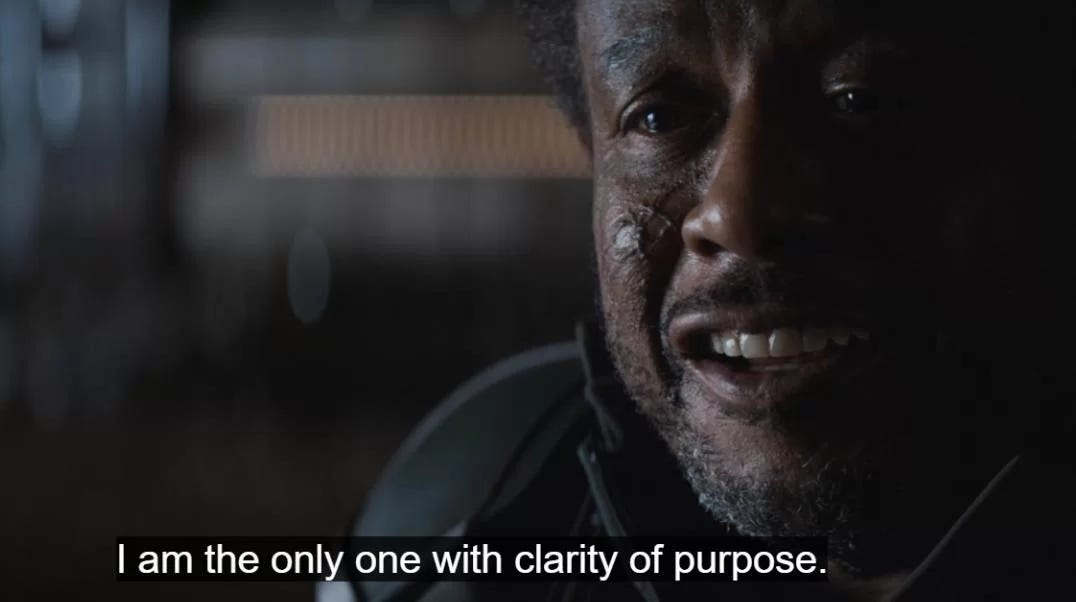
Like I said, every single episode of Andor is an embarrassment of riches.
I really hope the Star Wars franchise learns the right lessons from the critical and commercial success of Andor. I really do. I hope they focus on letting creators tell a full and new story, to tell their own story, and not just mandate the assembly line creation of cheap copies of this show’s patterns, all made fast and easy and with no understanding of the show's heart and soul, or why it works.
Fingers crossed, but I won’t hold my breath.
Star Wars got lost a long time ago in dull Jedi shit, and more shows like Andor—that rare breed of smart, cool, fun, and very timely sci-fi that can be enjoyed by fans and non-fans alike—can help bring back the old franchise’s faded glory.
May the Force be with us all...
